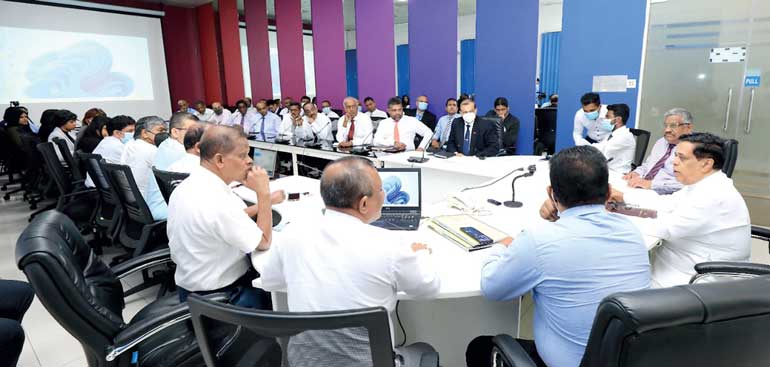Friday Feb 27, 2026
Friday Feb 27, 2026
Wednesday, 17 August 2022 00:00 - - {{hitsCtrl.values.hits}}

Ports, Shipping and Aviation Minister Nimal Siripala de Silva chairs the meeting with airline and aviation industry representatives and officials
By Yakuta Dawood
Urgent efforts are underway to ensure adequate supply of jet fuel to keep the travel and tourism sectors ticking in the upcoming winter season.
Ports, Shipping and Aviation Minister Nimal Siripala de Silva announced yesterday that possible measures will be immediately taken to overcome the situation and stabilise the aviation services.
In a statement he emphasised that private sector parties could be encouraged to import jet fuel if the CPC faced difficulties determining how to prioritise to meet the necessary requirements.
A number of institutions from the private sector that represents the aviation services sector stated that they could import and distribute aviation fuel on their own with the support and facilitation of the CPC and the Ministry of Power and Energy. Additionally, a CPC official present during the discussion revealed that two crude oil vessels are anticipated to arrive in Colombo soon and that the Sapugaskanda Refinery would be able to supply 600 metric tons of aviation fuel per day to continue supply as of 20 August.
Subsequently, airline representatives at the meeting emphasised the need for a steady supply of aviation fuel for the industry’s survival, especially in light of the increased volume of flights expected to land at Bandaranaike International Airport in the upcoming months for the holiday season.
With the present difficulty in procuring jet fuel the country has experienced a significant reduction in flight operations during the past few months.
According to the Civil Aviation Authority of Sri Lanka (CAASL), this matter is to be resolved soon.
CAASL Chairman Upul Dharmadasa told the Daily FT that CPC is expected to provide sufficient jet fuel to use under ‘emergency reserves’ for flights arriving and departing from Sri Lanka after the arrival of the scheduled shipment.
Explaining the current situation, Dharmadasa said that in order for flights to operate, there must be enough fuel for the return trip, in addition to roughly 10,000 to 15,000 litres of jet fuel for emergency reserves. However, due to the recent fuel crisis, Sri Lanka was unable to supply emergency reserves, which led to flight cancellations and a significant decrease in flight operations.
“A flight from Dubai to Colombo will need approximately 70,000 litres of jet fuel for the round trip and an addition of 15,000 litres as emergency reserves, which Sri Lanka was unable to provide. Due to this, airlines had to reduce passenger capacity and cargo loads to carry out the additional fuel. “Therefore, this would have been a key reason why flights reduced or cancelled their operations,” Dharmadasa explained.
Further, due to the severe fuel shortage, several international airlines including the national carrier – SriLankan Airlines were compelled to utilise Trivandrum, Chennai, and Kochi airports in South India as a refuelling base before continuing to Sri Lanka.
However, Dharmadasa stated that flight operations would return to normal as a result of the recent agreement between the Power and Energy Ministry and CPC to obtain jet fuel for one year.